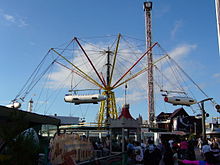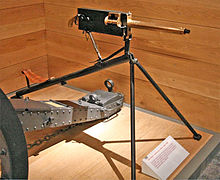
Let us start with a quiz. What do the following have in common?

 The answer lies in the curious career of Hiram Maxim. Hiram Maxim was a genius.
The answer lies in the curious career of Hiram Maxim. Hiram Maxim was a genius.
Who was responsible for the first heavier than air flight? Who invented the lightbulb? The answer is Hiram Maxim. Whose invention shaped the First World War. You’ve guessed it.
Hiram Maxim was born in the United States but came to Europe. He was a prolific inventor and among his inventions were mousetraps, curling irons and the first automatic firesprinkler. However he exprience a moment of enlightenment-if that is the right word- when in a hotel in Vienna a fellow American said:
“If you want to make money invent something that will enable these Europeans to cut each others throats with greater facility.”
So he did.
The Maxim Machine Gun was the first fully automatic portable machine gun. It was produced in cooperation with Vickers, the same firm that later went on to make aircraft at Squires Gate Blackpool. Because of its extraordinary firepower the Maxim Machine Gun was bought by all the major European Powers. It also helped bring civilization to Africa where in the lines of Hilaire Belloc:
In the end we have got
The Maxim Gun and they have not.
So Hiram Maxim was a very rich man. He was a friend of Edward V11. His passion was developing heavier than air flight and he produced a magnificently steampunk aircraft which weighed 3.5 tons and was powered by steampower. The prototype ran on rails and when it began to take off the experiment had to be aborted. In order to finance his interest in flight he produced the “captive flying machine.” The one at Blackpool Pleasure Beach dates to 1904 and is the oldest operating ride in Europe.
In the First World War the Maxim Machine Gun and its successors changed the face of warfare. In the past wars had been settled by a big battle such as Waterloo. The combatants fought it out and everybody went home happy… except the dead.
However at the beginning of the First World War the British were confident that a single battle would settle the affair. Their tactic was to shell the German lines and than attack. But the cunning Hun were quick to work out that an artillery attack was a prelude to an infantry attack. At an artillery attack they would withdraw or retreat to deep bunkers. Then they would return to their lines and man their machine guns whilst the British Infantry approached across open space made more difficult by the earlier artillery attack. Several thousand lives later the British and their allies realised this. The machine gun had made attacking a great deal more expensive than defending and the opposing armies dug trenches and killed one another in the hope that the other side would run out of people. The British High Command still talked chirpily about “one big push.” Eventually the Germans and their allies did actually run out of people but it took a very long time and a great many lives.
The Derby family is one of the great English families. They first came to prominence at the Battle of Bosworth where they played their cards cannily supporting the future Henry V11 at the last moment. Supposedly a member of the family handed the future Henry V11 Richard 111’s circlet after the Battle of Bosworth. If you know what a circlet is I suggest you get out more. A circlet is a kind of informal crown worn on more informal occasions such as when being killed at the Battle of Bosworth. The Derby family continued to play cannily. They briefly got unstuck during the Civil War when James was executed by the Parliamentarians following war crimes at the Battle of Bolton. He was executed at the scene of his crimes.
However the family soon recovered. The Earl of Derby appears in Shakespeare’s Richard 111. In fact some people believe that the Earl of Derby wrote Shakespeare’s works.
Be that as it may the Derby family were enormously influential in Lancashire. They were called the Kings of Lancashire and the fourteenth Earl was Prime Minister three times in the Nineteenth Century. The family were the most prominent Conservative Family. The family name was Stanley and Stanley Park, Derby Baths are all named in their honour. Throughout Lancashire there are innumerable Stanley Arms and Derby Arms, testament to the creepy obsequiousness of our ancestors.
In the First World War the problem was manpower. Unlike the other belligerents Britain did not have conscription.
Lord Derby was the British War Minister from 1916 to 1918. He had the idea that people from the same area might like to be pointlessly slaughtered amongst their friends so in a speech at Liverpool he proposed the idea of the Pals Regiments. People flocked to enlist.
On the First of July 1916 700 of the Accrington Pals advanced on the village of Sere. 235 were killed and 350 wounded in twenty minutes in large part because of the invention of Hiram Maxim. Subsequently the idea of Pals Regiments was abandoned. Lord Derby went on to play a part in the Versailles Peace talks.
